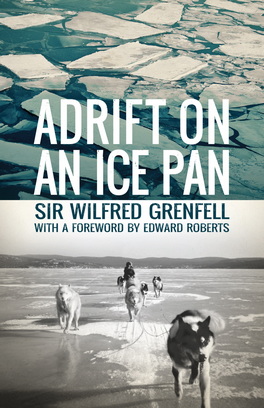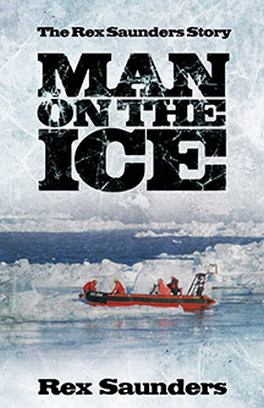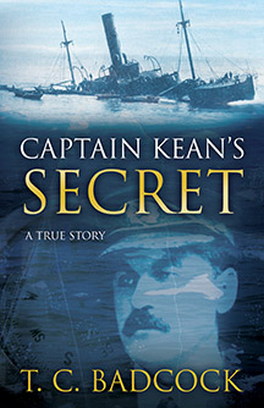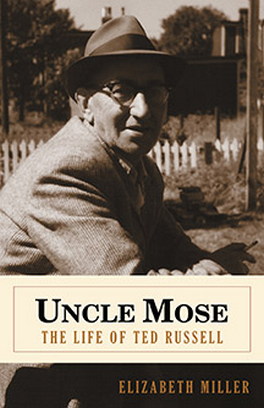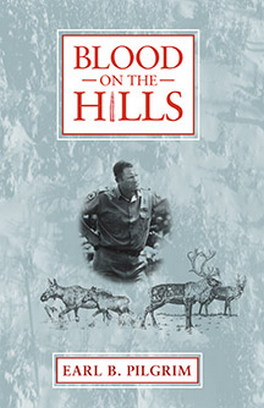On Easter Sunday, 1908, Dr. Wilfred Grenfell was summoned to treat a boy with osteomyelitis who had been operated on two weeks earlier. The young man needed immediate attention to save not only his leg but his life, so the doctor set out from St. Anthony, Newfoundland, with his komatik and his eight best dogs. To save a few miles, Dr. Grenfell took a shortcut across a bay, but the ice broke up beneath him, his komatik sank, and one dog drowned. He and the other dogs climbed out of the water onto an ice pan, which drifted out to sea in an offshore wind. In the cold and solitude of a day and a night on the ice, the doctor was now in peril. Frostbitten and snow-blind, he turned to his remaining dogs and performed one final, desperate act in an attempt to save his life. Adrift on an Ice Pan is the best known of the autobiographical accounts of Sir Wilfred Thomason Grenfell, the famous Labrador doctor. Originally published in 1909, it has sparked much discussion over Dr. Grenfell’s character: his legendary ingenuity, evangelical faith, and love of adventure.
It was Easter Sunday at St. Anthony in the year of 1908, but with us in northern Newfoundland, still winter. Everything was covered with snow and ice. I was walking back after morning service, when a boy came running over from the hospital with the news that a large team of dogs had come from sixty miles to the southward, to get a doctor on a very urgent case. It was that of a young man on whom we had operated about a fortnight before for an acute bone disease in the thigh. The people had allowed the wound to close, the poison matter had accumulated, and we thought we should have to remove the leg. There was obviously, therefore, no time to be lost. So, having packed up necessary instruments, dressings, and drugs, and having fitted out the dog-sleigh with my best dogs, I started at once, the messengers following me with their team.
My team was an especially good one. On many a long journey they had stood by me and pulled me out of difficulties by their sagacity and endurance. To a lover of his dogs, as every Christian man must be, each one had become almost as precious as a child to its mother. They were beautiful beasts: “Brin,” the cleverest leader on the coast; “Doc,” a large, gentle beast, the backbone of the team for power; “Spy,” a wiry, powerful black and white dog; “Moody,” a lop-eared black-and-tan, in his third season, a plodder that never looked behind him; “Watch,” the youngster of the team, long-legged and speedy, with great liquid eyes and a Gordon-setter coat; “Sue,” a large, dark Eskimo, the image of a great black wolf, with her sharp-pointed and perpendicular ears, for she “harked back” to her wild ancestry; “Jerry,” a large roan-coloured slut, the quickest of all my dogs on her feet, and so affectionate that her overtures of joy had often sent me sprawling on my back; “Jack,” a jet-black, gentle-natured dog, more like a retriever, that always ran next to the sledge, and never looked back but everlastingly pulled straight ahead, running always with his nose to the ground.
It was late in April, when there is always the risk of getting wet through the ice, so that I was carefully prepared with spare outfit, which included a change of garments, snowshoes, rifle, compass, axe, and oilskin overclothes. The messengers were anxious that their team should travel back with mine, for they were slow at best and needed a lead. My dogs, however, being a powerful team, could not be held back, and though I managed to wait twice for their sleigh, I had reached a village about twenty miles on the journey before nightfall, and had fed the dogs, and was gathering a few people for prayers when they caught me up.
During the night the wind shifted to the northeast, which brought in fog and rain, softened the snow, and made travelling very bad, besides heaving a heavy sea into the bay. Our drive next morning would be somewhat over forty miles, the first ten miles on an arm of the sea, on saltwater ice.
In order not to be separated too long from my friends, I sent them ahead two hours before me, appointing a rendezvous in a log tilt that we have built in the woods as a halfway house. There is no one living on all that long coastline, and to provide against accidents—which have happened more than once—we built this hut to keep dry clothing, food, and drugs in.
The first rain of the year was falling as I started, and I was obliged to keep on what we call the “ballicaters,” or ice barricades, much farther up the bay than I had expected. The sea of the night before had smashed the ponderous covering of ice right to the landwash. There were great gaping chasms between the enormous blocks, which we call pans, and half a mile out it was all clear water.
An island three miles out had preserved a bridge of ice, however, and by crossing a few cracks I managed to reach it. From the island it was four miles across to a rocky promontory—a course that would be several miles shorter than going around the shore. Here as far as the eye could reach the ice seemed good, though it was very rough. Obviously, it had been smashed up by the sea and then packed in again by the strong wind from the northeast, and I thought it had frozen together solid.
All went well till I was about a quarter of a mile from the landing-point. Then the wind suddenly fell, and I noticed that I was travelling over loose “sish,” which was like porridge and probably many feet deep. By stabbing down, I could drive my whip handle through the thin coating of young ice that was floating on it. The sish ice consists of the tiny fragments where the large pans have been pounding together on the heavy sea, like stones of Freya’s grinding mill.
So quickly did the wind now come off shore, and so quickly did the packed “slob,” relieved of the wind pressure, “run abroad,” that already I could not see one pan larger than ten feet square; moreover, the ice was loosening so rapidly that I saw that retreat was absolutely impossible. Neither was there any way to get off the little pan I was surveying from.
There was not a moment to lose. I tore off my oilskins, threw myself on my hands and knees by the side of the komatik to give a larger base to hold, and shouted to my team to go ahead for the shore. Before we had gone twenty yards, the dogs got frightened, hesitated for a moment, and the komatik instantly sank in the slob.
His account is riveting, a slice of history and incredible adventure following folly.-- Atlantic Books Today --
